Plain Song is the official English translation of Uta, a freeware Japanese visual novel created by Eno Yamamoto Ten and originally released on July 6, 2001. The English version, which was first made available on October 11, 2005, as part of the al|together 2005 translation festival, was translated by Mr. Seung Park of Insani and Misu-Net.
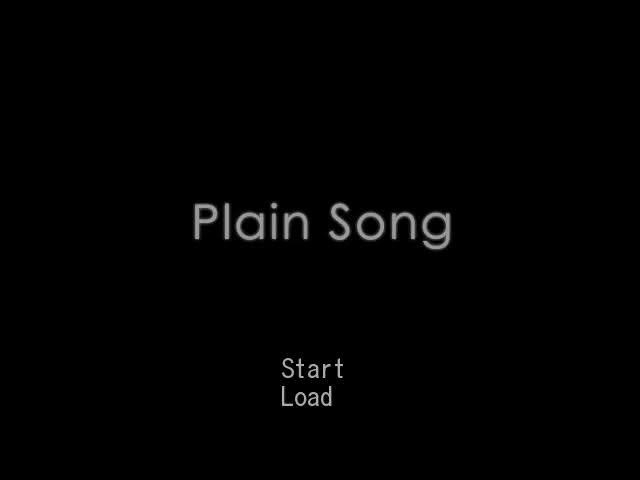
You can learn more about my al|together project by reading my project introduction article. That article includes a running list of our completed al|together reviews. I have a dedicated collection post with links to all of our al|together articles, including reviews, essays, and short posts.
In boring times, lonely times, if when bad things happen this game allows you to forget for just a little bit, just for an instant or two, then I [truly believe] that making it was worthwhile.
Eno Yamamoto Ten (Readme)
The Japanese version of Plain Song, Uta, is the oldest of all of the visual novels that were translated for al|together, having been released in mid-2001. Plain Song follows Ryuuji Iwamoto, an aspiring-yet-unpopular street musician, as he gets to know his first (and at first, only) fan, the painfully shy Fuuka Onisaki. Ryuuji and Fuuka grow closer, and we learn about their individual challenges. I also reviewed a related parody of Plain Song which I note in the next section.
Note on Related Works
In addition to Plain Song, I published a review of Plain Song Christmas Special, a related visual novel also created by Eno Yamamoto Ten and published on Christmas day, 2001. Plain Song Christmas Special is a slapstick parody game which requires knowledge of Plain Song to appreciate, but it does not advance the story of Plain Song in any way. That is, Plain Song Christmas Special may be enjoyed by people who played Plain Song, but it adds nothing to the story of the main game.
Moreover, the al|together 2005 festival featured a translation of Eno’s third visual novel, The Poor Little Bird – which was my first visual novel review of the al|together project back in May 2021. While The Poor Little Bird is not related to either of the Plain Song visual novels, it shares certain stylistic and aesthetic similarities.
Plain Song Details
English release
| Title | Plain Song |
| Translators | Seung Park, Misu-Net |
| Release Date | October 11, 2005 |
| Engine | ONScripter |
| Official Website | al|together 2005 |
Japanese release
| Title | Uta |
| Developer | Eno Yamamoto Ten |
| Release Date | July 6, 2001 |
| Engine | NScripter |
| Archived Website | Archived |
Downloading and Running Plain Song
Plain Song is available as a torrent from the official websites for Windows, Linux, and MacOS. It is also available from a couple of sources as a direct download.
- al|together 2005 (Torrent)
- Kaisernet (Windows Direct)
If you have the know-how, I recommend seeding one of the Plain Song torrents. However, the Kaisernet site has a direct download link for the Windows version of Plain Song – and the contents of the Windows .exe can be extracted and run natively on Linux, MacOS, or BSD with the proper ONScripter-EN version (see next paragraph for resources). If any of these links are not working, you can try downloading Plain Song directly from a MEGA folder with all of the al|together and Insani games (I have talked to the maintainer of the folder, who received some of the games directly from former members of Insani – the versions are the same as what are available on the original sites).
I ran Plain Song natively on Linux by extracting the contents of the Windows .exe into a new directory and running the latest build of ONScripter-EN in the directory. You can see my guide for extracting the contents of a Windows .exe ONScripter-EN game here and my guides on running the latest ONScripter-EN version in a directory for Linux here (system-wide, local). Note that these guides should work for MacOS and BSD users as well with the correct ONScripter-EN versions for those systems.
I installed the Windows version of Plain Song on my Linux system on top of WINE with no issue – and it seems to run fine in very brief tests. While I did not play the Windows version other than to test the installation on top of WINE on my Linux system, I did see reports on the Visual Novel Database of at least one Windows user having crashing issues. If you are running the Windows versions and have issues, you may consider trying Kaisernet’s guide to running Plain Song with a newer version of ONScripter-EN.
General overview of Plain Song
As always, I like to start with the official description of the visual novel that I am reviewing. I quote from the description, written by Insani, for the al|together 2005 festival:
A piece about a lonely (and apparently unpopular) young musician and the quiet girl who listens to him sing every day. Makes minimal use of graphics, but has pleasant characterization, and makes use of a soundtrack provided by the ever-present KeNji.
This is an apt description. While there is more to Plain Song than the one sentence introduction to the story, it is fundamentally the story of a young musician and the quiet girl who listens to him sing every day. Plain Song is one of the most graphically minimal games of the al|together translations, featuring modified photographic backgrounds, text, and nothing more.
The introduction then notes the author of Plain Song, Eno, whose games made three appearances in al|together 2005:
Eno’s hallmark – and the great draw of his productions – is his empathy for his characters, and you see that in best effect in this, his first (and some would say best) piece.
This is also on point. It is clear from Plain Song that Eno has great affection for the two protagonists of the story, the lonely musician Ryuuji Iwamoto, and his single fan, Fuuka Onisaki.
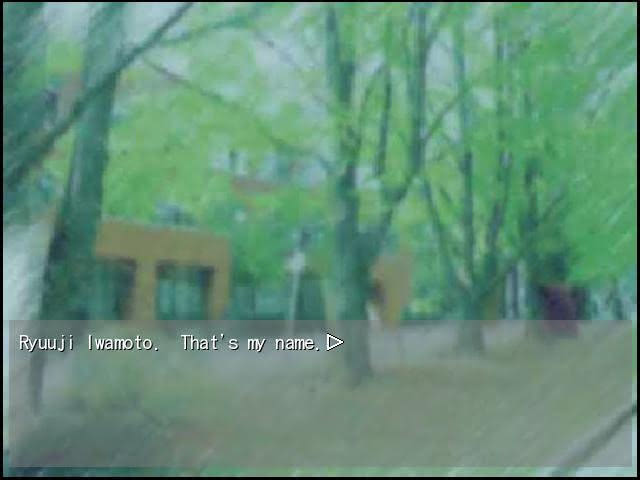
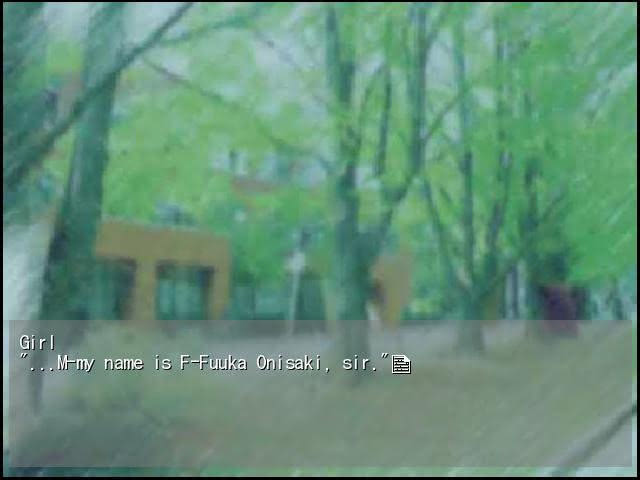
While I plan to write a follow-up piece on Plain Song which will address the story in detail, this review is intended to be free of spoilers that potential first-time readers would want to avoid. Thus, I will offer a short, spoiler-free introduction.
Plain Song begins with Ryuuji, a young musician, describing his late afternoon street concerts. He noted that one, and only one person, always stops by and listens to him.
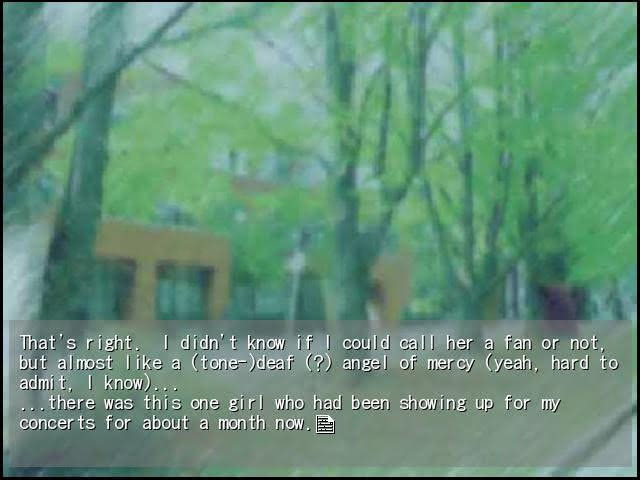
However, his efforts to thank her were unsuccessful – because she always ran away when he made eye contact or approached her. Unsurprisingly, Ryuuji manages to catch up to the girl, who he learns is named Fuuka Onisaki, early in the story. Ryuuji learns that Fuuka is painfully shy and a bit depressed, and Fuuka learns that Ryuuji is grateful for her always listening to his music.
Ryuuji and Fuuka get to know each other as they spend time together after his outdoor concerts. Through these interactions, Ryuuji learns the reason for the sad look that Fuuka often has in her eyes. Eventually, he has the opportunity to use his music to repay the young woman who unwittingly has inspired him to not give up on his dreams.
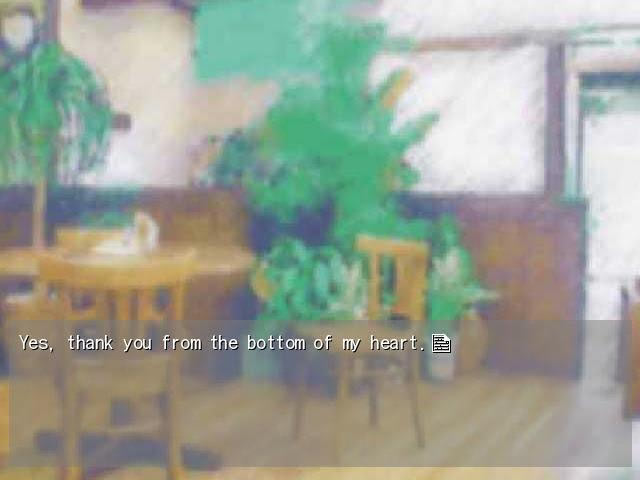
Provided the player makes the correct choices (more on those in a bit), there will come a couple of decision points in the growing relationship between Plain Song’s awkward protagonists.
The story begins as an example of the capacity of art to move, even if it only moves an audience of one.
Plain Song Review
Below, I review Plain Song’s different components.
Estimated reading time
Visual Novel Database only has two estimated reading time submissions. One reader reported 1 hour and 45 minutes while another reported only 30. In either event, Plain Song is short by the standards of visual novels as a genre, but it is on the longer side for an al|together translation (and certainly much longer than Eno’s third work, The Poor Little Bird, which can be read in less than 10 minutes). I took my time while reading to create a few save points and capture many screenshots for use in this article. For that reason, I was not closely monitoring estimated reading time. I will say 30 minutes would be on the very short side, but 1 hour and 45 seems long. The truth is likely somewhere close to one hour for most readers, give or take 10-15 minutes either way.
Game-play and structure
Plain Song is broken into seven chapters of similar lengths. There is a short epilogue after Plain Song’s single good ending.
Plain Song has at least three in-game choices. At least two of the later choices are decisive. I will use the at least formulation for the benefit of readers who may want to read Plain Song for themselves after going through my review.
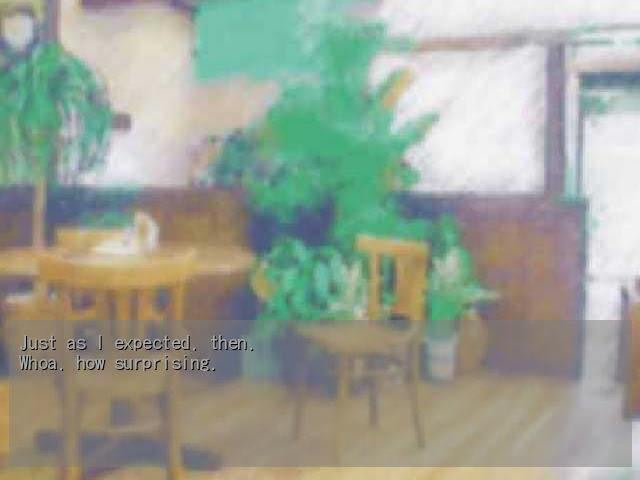
Two of Plain Song’s choices require the player to choose correctly in order to advance toward the good ending. That is, achieving the good ending requires making two correct choices. The first decisive choice appears in the middle of the game, and it is my view that it should be impossible for any sentient reader to get it wrong unintentionally. The final decisive choice, which I will discuss later in the review, has an obvious answer for attentive readers, but it is nevertheless more ambiguous than the first decisive choice.
While Plain Song has a couple meaningful choices, in practice it is still closer to a kinetic visual novel (a visual novel with no player interaction) than an interactive one. The choice structure is not complex, reminiscent of one of my earlier al|together reviews, Shooting Star Hill, having a combination of meaningless choices and one choice which decides whether the ending is good or bad. Moreover, there is only one good ending – the endings resulting from the wrong choices are clearly disfavored. The requirement that the player make multiple correct choices to get to the true ending is similar to what we saw in Wanderers in the Sky, but it is worth noting that Wanderers in the Sky had more choices for a significantly shorter run time ( however, that Plain Song is a significantly better visual novel than Wanderers – so you should not take that as a commentary on quality).
Unlike some of the visual novels that I have looked at, such as At Summer’s End, Plain Song does not allow the player to save when a choice prompt appears. That is, as soon as choices appear on screen, the player cannot save until after making a choice. However, the menu includes a handy “Skip To Next Choice” option which makes it easy to return to choices in very little time.
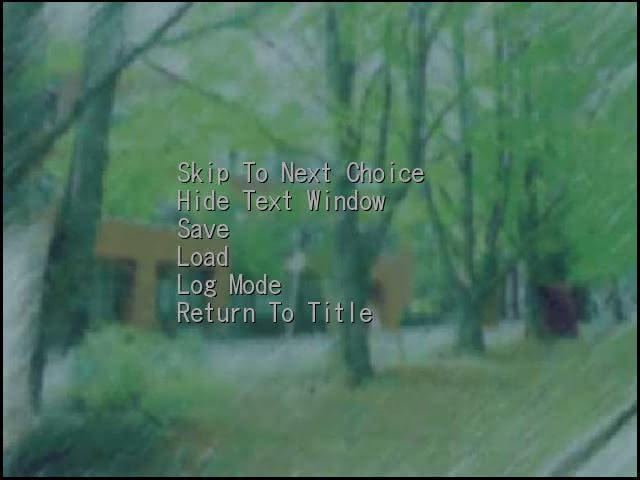
Visual presentation
Many of the al|together visual novels, which we should remember were freeware projects built in the first decade of the 2000s with a basic scripting engines, are very simple. Plain Song is one of the plainest visual efforts of the al|together visual novels. Like The Poor Little Bird, Eno’s third visual novel, Plain Song features no character sprites (Eno stated that he had hoped to create one for Fuuka, but he ran out of time). Thus, we are left with backgrounds and text. All of the backgrounds in Plain Song are modified photographs.

Plain Song confines the in-game text to a text box. I prefer this style of text presentation to overlaying the background from top to bottom (Eno used that method in The Poor Little Bird). Moreover, the text box includes the speaker’s name when a character is actually speaking (which are absent from Ryuuji’s internal monologues).
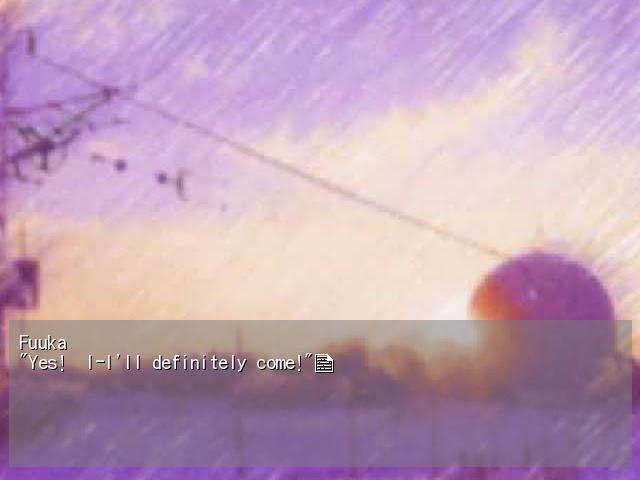
The modified photographs in Plain Song are adequate and there are a good number to represent the story’s numerous locales, but they are for the most part generic and nondescript. The term sound novel was made for productions like Plain Song.

Its overall aesthetic compares unfavorably to Eno’s final project, The Poor Little Bird, which featured appealing painted backgrounds.
I noted in the previous section that Plain Song is broken into seven chapters. The chapters are noted with title cards – however, the title cards consist of nothing but plain text against a black background. Contrast these with the fully drawn cards that we saw in al|together projects such as Red Shift and At Summer’s End.
Music
Plain Song has song in the title and the main character is a musician. For this reason, one should expect that it has, at a minimum, a pleasant soundtrack. It clears that bar.
Upon opening Plain Song, players will be treated with the sound novel’s best track on the title screen. The song, which is called Opening, makes an in-game appearance at Plain Song’s emotional and thematic climax. It is quite good, and one of the best background tracks of the 15 al|together visual novels that I have reviewed thus far.
None of the other tracks in Plain Song are as memorable as the opening, but the selection of 13 background songs is more than enough to avoid becoming repetitive and to set the mood for Ryuuji’s and Fuuka’s many conversations. Readers will hear the variety early in the game when they encounter tracks that accompany Ryuuji chasing Fuuka and Fuuka being embarrassed. Of the regular tracks, Hitori, Huuka, and Yuuki are the stand-outs .
One minor disappointment is that only the opening song is ever used in conjunction with one of Ryuuji’s performances. Plain Song takes a tell but don’t play approach to its musician protagonist. Here, it compares unfavorably to al|together 2008’s May Sky, which also featured music as a theme (to be fair, however, just about all of the al|together games compare unfavorably to May Sky).
Translation quality
I preface my translation analysis, as always, by noting that I do not read Japanese. Thus, even if I had the Japanese version of Uta, I can only assess the translation in terms of how it reads in English.
Much of Plain Song consists of conversations between Ryuuji and Fuuka. One’s enjoyment of Plain Song depends very much on how much one likes its two protagonists. Thus, I imagine that a deft hand was needed to ensure that Eno’s care for Plain Song’s main duo made it into the English version.

Plain Song is one of the best-reading al|together games, and it is clear that Mr. Seung Park and Mitsu-Ten, the translators, worked meticulously to preserve and highlight the charm of Ryuuji, Fuuka, and their quaint interactions. Again noting that I cannot compare the English end-product to the Japanese original, I will venture, based on the result and the amount of work that must have been required, that Plain Song was likely one of the better translation efforts of the al|together festivals. Other than two obvious typos late in the translation (these can be fixed via editing the game’s 0.txt file, albeit one should know what he or she is doing before trying that), I had no issues with Plain Song in English.
I will note one interesting point for potential readers who may not be familiar with anime, manga, or Japanese honorifics more generally. One point of (joking) tension early in the game is that Fuuka insists on calling Ryuuji “Sir” despite the fact that they are the same age. I assume here that she was affixing -san, or another sort respectful honorific, to his name. Japanese honorifics often do not translate perfectly to English (I noted this indirectly in my review of part of a movie called 5 Centimeters Per Second), but the “Sir” exchanges make sense with a little bit of background knowledge.
Writing and story quality
At its best points, Plain Song’s story and writing is in the top-tier of al|together visual novels and compares favorably to most commercial visual novels as well. However, its best points are mitigated by some issues which crop up later in the story. This novel is interesting enough to warrant a fuller analysis in the future, but for this introductory review, I will offer my thoughts in as detailed a manner as possible without spoiling the story.
Thank you very much for choosing to play this game. Since this is the first game I’ve made, please understand that there are several places that are strange or exhibit shoddy workmanship. My hope is that this game will let you feel something, even if just a little.
Eno Yamamoto Ten (Readme)
Plain Song’s best aspect is its two lead characters, Ryuuji and Fuuka. That Eno cared for both Ryuuji and Fuuka is conveyed through his writing, and their conversations are genuinely engaging and fun to read – with a dynamic rivaling that of May Sky’s Haruki and Minori. Ryuuji is a good guy who starts the story off as being a bit discouraged by the fact that no one, save for one (who runs away from him at the start of the game), listens to his music. Fuuka’s shyness and melancholy nature are handled with empathy. They both grow through getting to know each other, and Plain Song clearly, without saying so explicitly, articulates the view that Ryuuji’s struggles as an aspiring musician were made worthwhile through his efforts to reach the heart of one kind listener.
Another strength of Ryuuji’s and Fuuka’s conversations is Eno’s emotional writing range. Ryuuji’s earnestness and Fuuka’s shyness serve as sources of comedy – but always while respecting the characters. Their uncertainty, grief, and resilience at different points of the story are handled with similar care.
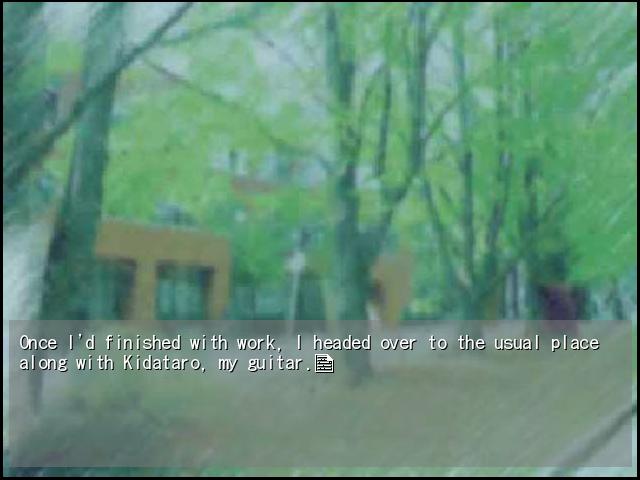
Plain Song’s broader story benefits from its simplicity. Eno never forgets that Plain Song is about the relationship and challenges of Ryuuji and Fuuka. He is also more opinionated in his writing here than he is in The Poor Little Bird. When Ryuuji has a choice regarding what to prioritize in his life, it is clear which option the story’s creator understands to be the correct answer for Ryuuji.
Having noted Plain Song’s considerable strengths, I move on to note its shortcomings – which detract a bit from the overarching story. While I do not fancy myself as being among the legions of cliché police, even I could not help but note that one of the central sources of Fuuka’s melancholy involved more than one common trope of visual novels of the type. Without spoiling, I came away with the view that, contrary to the interesting and touching interactions between Fuuka and Ryuuji, Eno did nothing to make his use of tropes in this area stand out from other visual novels – leaving Fuuka’s strong characterization to make the emotional impact of the trope events credible.
The emotional and thematic climax of Plain Song comes about 60%-70% into the story. Provided the player makes the correct choice for Ryuuji, he repays what he believes is his debt to Fuuka for her having given him the strength to keep working at becoming a musician. This scene was intended to be the high point of Plain Song and it delivered. To its credit, Plain Song was creative in how it had that moment affect the story – particularly Ryuuji’s growth in his craft. However, after the first scene or two following Plain Song’s big moment, things started to feel a bit rushed toward the conclusion.
Plain Song’s rushed conclusion manifests in its final choice, which decides whether the player sees the good ending or the second bad ending. I am constrained by my desire to keep the review spoiler free, but it should suffice to say that the final branch concerns Ryuuji’s future, and Fuuka’s place in that future. There are several issues with the final choice and its execution. Firstly, the correct choice (assuming the player understands the choice in question as being decisive) should be obvious to readers who take the time to understand Eno’s perspective as the creator of the story. However, the short path that the story takes from the choice itself to the respective ending is lacking. The most serious problem is that Plain Song, which consistently shows Ryuuji and Fuuka coming to understand each other as they get to know each other through their interactions, decides in the end to have Ryuuji make a decisive decision which affects both of them entirely on his own. This made it more convenient in a structural sense to get from the final decisive choice to the conclusion, but it also undercut one of the most important aspects of Plain Song. Notably, one of my issues with Eno’s later work, The Poor Little Bird, was that many of the problems that the characters faced were caused by not listening and asking questions. Plain Song’s bad ending is very much in that vein, while in the case of its good ending, Ryuuji appears to just happen to make the correct choice (in Eno’s view, at least – albeit I note for the record that I have no concerns with Eno’s point of view).
The epilogue for the good ending, which comes after the credits, is a nice capstone to the story of Ryuuji and Fuuka – but it too reads like Eno was a bit pressed for time. The sentiment is there, but the dialogue lacks the specific warmth that it often had earlier in the main story.
Before proceeding to our conclusion – another minor issue I had with Plain Song is that it almost never emphasized what Ryuuji sang about – save for its climactic scene. To be sure, Ryuuji begins the game as an amateur musician with big dreams and a single fan. However, it would have been interesting to learn a bit more about the content in his songs that moved Fuuka before she met him, even if we were only given one clear example.
Miscellaneous technical notes
Plain Song’s climactic scene has an interesting mechanic. In this scene, the text advances without the player’s input, and it is in fact impossible to manually advance the text by using the left click button or enter. When I first encountered the scene, I thought that I had encountered some sort of bug – but it soon becomes clear that this mechanic was implemented by design to make the text stay aligned with the background music. I approve of the technique – which is unique among the al|together visual novels that I have played thus far – but there are a few technical issues with the cursor in the text box (on the Linux version – at least, and note that none of these issues affect the readability of the text).
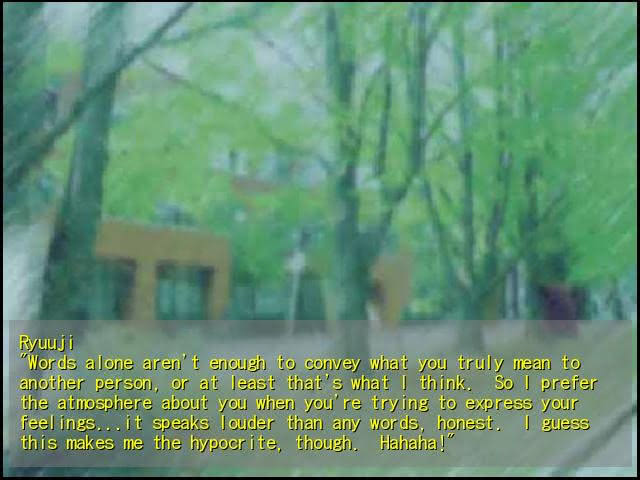
Other than the “Skip to Next Choice” feature that I discussed with the choices, Plain Song has no special menu functionality. It comes with an ample assortment of save slots.
Finally, I noted one odd point with how the endings work. If the player reaches one of Plain Song’s two bad endings – either the mid-game bad end or the bad end from the final decisive choice – Plain Song closes itself upon completing the ending.

However, if the player gets the true end, Plain Song returns to the title screen after the epilogue. It is not a big deal – and no one will mistakenly think that one of the two bad endings is a good ending – but the correct behavior after the bad endings would have been for Plain Song to return to the title screen instead of terminating.
Conclusion
Plain Song is one of the best-written al|together visual novels, and also one of the easiest to recommend to general readers. If you took the time to read my review, you should take the time to read through Plain Song, regardless of whether you regularly read visual novels.
In boring times, lonely times, if when bad things happen this game allows you to forget for just a little bit, just for an instant or two, then I [truly believe] that making it was worthwhile.
Eno Yamamoto Ten (Readme)
While Plain Song had some pacing issues toward the end and I had some issues with how its final choice was handled, the package as a whole is appealing. Both Ryuuji and Fuuka are terrific characters, and although it is unfortunate that Eno was not able to create a character portrait for Fuuka, she gives enough of an account of herself that readers should be able to imagine one for her. Much of Plain Song is dominated by the conversations of Ryuuji and Fuuka, and it benefits greatly from the characters having a terrific, albeit awkward, rapport. Moreover, while Plain Song does not have many choices given its length, the fact that it does have some decisive choices may make it more appealing to those who demand some interactive elements in their visual novels.

Yet, while Plain Song is one of my favorite visual novels of the al|together set thus far, I cannot help but find it a touch disappointing. Its few flaws – such as the oppressive tropes in one significant plot-line in its first half and its implementation of the final decisive choice at the end – could have been resolved entirely without too many changes. A re-mastered version could have also done more to tell readers about Ryuuji’s songs – and what about them so moved Fuuka before their first real conversation. Plain Song is quite good even with its faults, but it could have been significantly improved with a few minor tweaks.